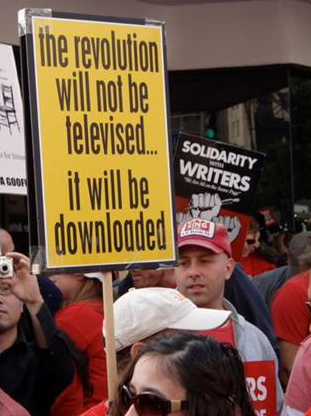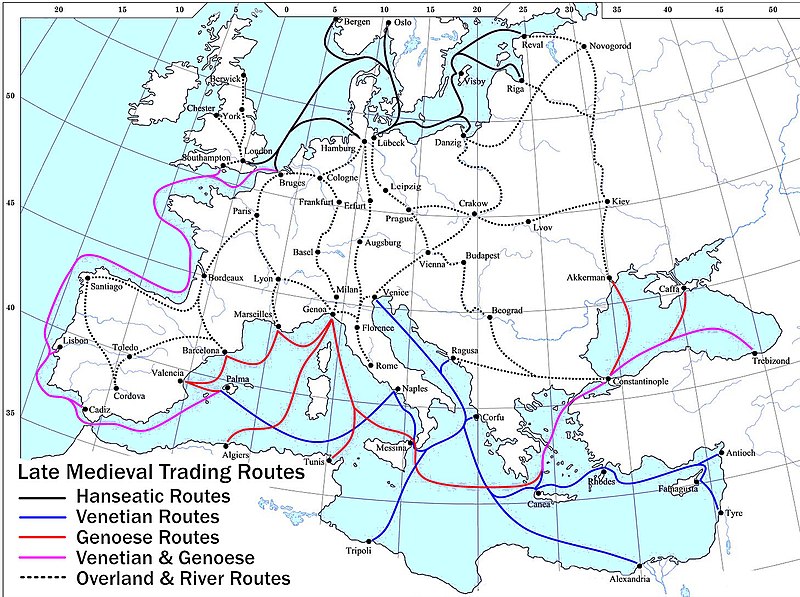Maghribi traders organizational system had intrinsic disadvantages that deterred its expansion and success.
How far is this applicable to current P2P?
Lets see first which are the fundamental differences between the Maghribis and "modern" P2P.
In comparing Maghribis organization with P2P (Magribis I) there was only one slight divergence: equipotency, one of the three characteristic of P2P listed by Michel Bauwens. Equipotency´s definition required that "there are no formal rules to prohibit anyone from participation". In defence of the hypothesis of Maghiribis traders as a P2P-pioneers it was argued that most "known P2P-systems also ban/block certain users due to their anti-cooperative behaviour" posing Wikipedia as an example.
It was however exclusion what undermined Maghribis possibilities of expansion, it was this closure what inhibit the model to expand beyond its ethnical-cultural group. It was also this exclusion what allowed the reputation model that in turn enabled the whole system to be comparable with a P2P. Hence exclusion of non-trustable members is the cornerstone of the architecture of the Maghribis organizational system.
The "principle of exclusion" is also present in P2P:
"This necessity for cooperation requires peer-production processes to adopt more engaged strategies for assuring that everyone who participates is doing so in good faith, competently, and in ways that do not undermine the whole, and weeding out those would-be participants who are not." (Benkler 2006,p.13-14).
"Standard" P2P also shows a strong dependence on the architecture that enables cooperation:
"Cooperation in peer-production processes is usually maintained by some combination of technical architecture, social norms, legal rules, and a technically backed hierarchy that is validated by social norms." (B.06,p.104).
Nevertheless it can be argued that even though the principle of exclusion is also present in standard P2P processes, it is of a different nature and it is definitively not its cornerstone. P2P as we know it is based on the capacity of its architecture to allow cooperation, to integrate and aggregate rather that exclude. It is openness rather than exclusion what makes it different. The relative difficulty to undermine its process does not depend on trust or punishment, It depends on the ability of the architecture to organize, filter and engage individuals into cooperation rather than on its power of punishment, or on the power to exclude.
Greif (1994) argues that cultural beliefs are the essence of the difference between Maghribis and Genoese. Differently in the case of P2P vs. industrial production, the argument is usually technological, it does not belong to the realm of the belief but to the material world:
"We need to assume no fundamental change in the nature of humanity; we need not declare the end of economics as we know it. We merely need to see that the material conditions of production in the networked information economy have changed in ways that increase the relative salience of social sharing and exchange as a modality of economic production." (B.06;p.94).
A broad capacitation of individuals is what enables them for cooperation,
"The declining price of computation, communication, and storage have, as a practical matter, placed the material means of information and cultural production in the hands of a significant fraction of the world's population" (B.06;p.4).
Necessarily Maghribis also needed to be able to cooperate, to posses the material means that capacitate them. Shipping technological development facilitated trade, "shipping was available even to a small merchant, who could rent storage space on a ship" (G.89, p.860) providing the technical capacitation needed for cooperation. Despite technical capacitation is obviously a necessary condition it was not technical capability but cultural beliefs as Greif (1994) defends the responsible of the Maghribis organizational system.
In the context of the expansion of the commercial revolution "Maghribis could not overcome the intrinsic limitations that the architecture of their net imposed." Exclusion imposed costs that inhibit their expansion and facilitated their disappearance, "we have to take into account the costs involved in operating the various social arrangements (...), as well as the costs involved in moving to a new system." (Coase1969, p.23). Maghribis cultural beliefs could not deal with material limitations.
The digital revolution has radically altered the "material conditions of production": while P2P is a result of technology, Maghribis organization is based on beliefs. Maghribis´ system is rooted, enabled and limited by exclusion, on the contrary, P2P is based on integration and aggregation. There are underlying fundamental differences in the organizational architecture of "current" P2P processes and Maghribis trading system. In as much P2P architecture is based on integration rather than on exclusion, it will not depend on beliefs but on technology and Maghribis´ limitations won't apply to P2P. If the architecture reaches its limits (if there are) and no further integration/aggregation is feasible, cooperation will be sustained by beliefs (instead of technology), there will be exclusion (at least what can not be integrated) and Maghribis´limitations might apply.
Is it possible still to argue that Maghribis where P2P pioneers?
Are they just another form of collectivism with no particular relationship with the present beyond that it is collectivist? I don´t think so. Some of the definitory features of P2P are common to the Maghribis as it has been argued. Individualism and collectivism were simbiotic, like it happens now in peer processes, as M. Bauwens argues,
"(...) this turn to the collective that the emergence of peer to peer represent does not in any way present a loss of individuality, even of individualism. Rather it ‘transcends and includes’ individualism and collectivism in a new unity, which I would like to call ‘cooperative individualism’."
Maghribis system fits into Benkler definition of common-based peer production,
"(...) the networked environment makes possible a new modality of organizing production: radically decentralized, collaborative, and nonproprietary; based on sharing resources and outputs among widely distributed, loosely connected individuals who cooperate with each other without relying on either market signals or managerial commands." (B.06, p.60).
It is when other definitions are used that the claim weakens. There is only equipotency among Maghribis, non-Maghribis are excluded. But Equipotency, as defined by M. Bauwens, even when it might not be universal must aim at universality:
"(...) everyone can potentially cooperate in a project, that no authority can pre-judge the ability to cooperate, but that the quality of cooperation is then judged by the community of peers, i.e. through Communal Validation. In equipotential projects, participants self-select themselves to the module to which they feel able to contribute."
Lets call this definition of the term that entails universality strict-equipotency. If strict-equipotency is a necessary condition for being considered a P2P process, hence Maghribis are not. If non-strict-equipotency (no universality) is fine then they are.
There is a feeling (which I share) that we are witnessing a shift of paradigm, a revolution (intellectual,participatory, mass amateurization, digital...). P2P is believed to be one of the new born enterprises of this revolution if not the alma matter, the core of the shift of paradigm.
Is this aim of universality a defining, necessary characteristic of the network economies resulting from this revolution? Might exclusion have still a role?
What is at the core of this alleged shift of paradigm?
* Republished at the P2PFoundation.






